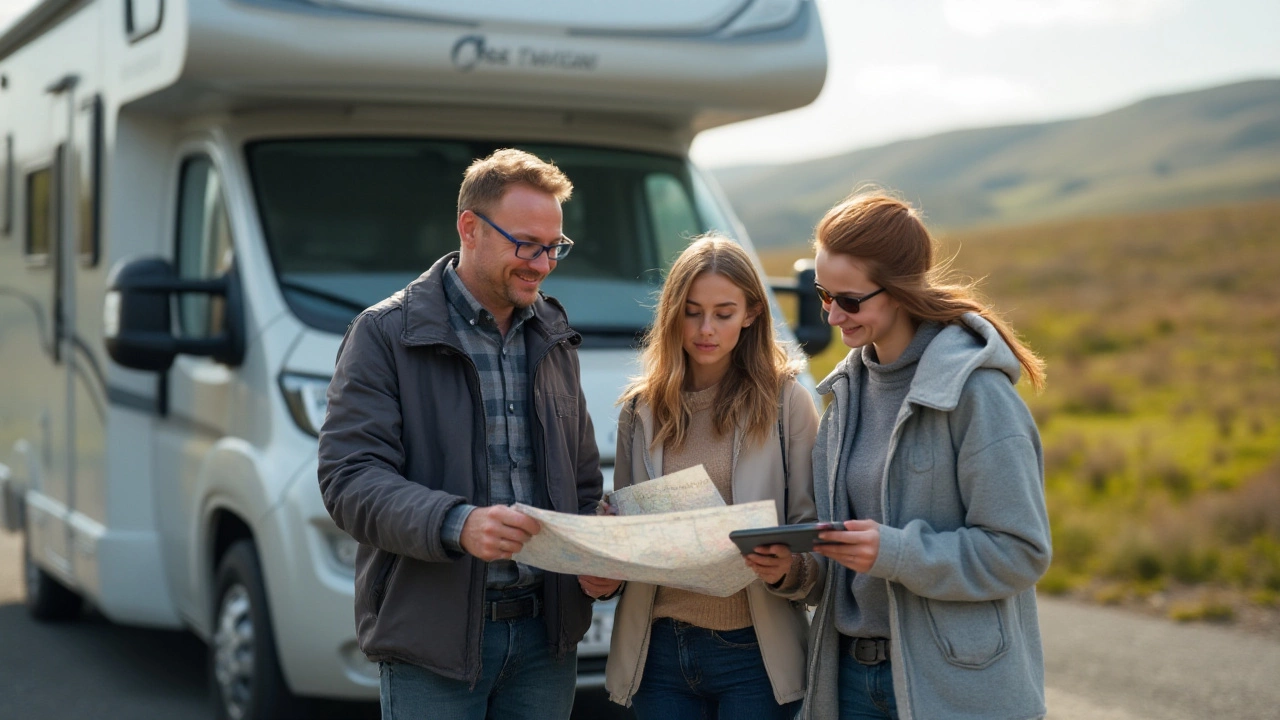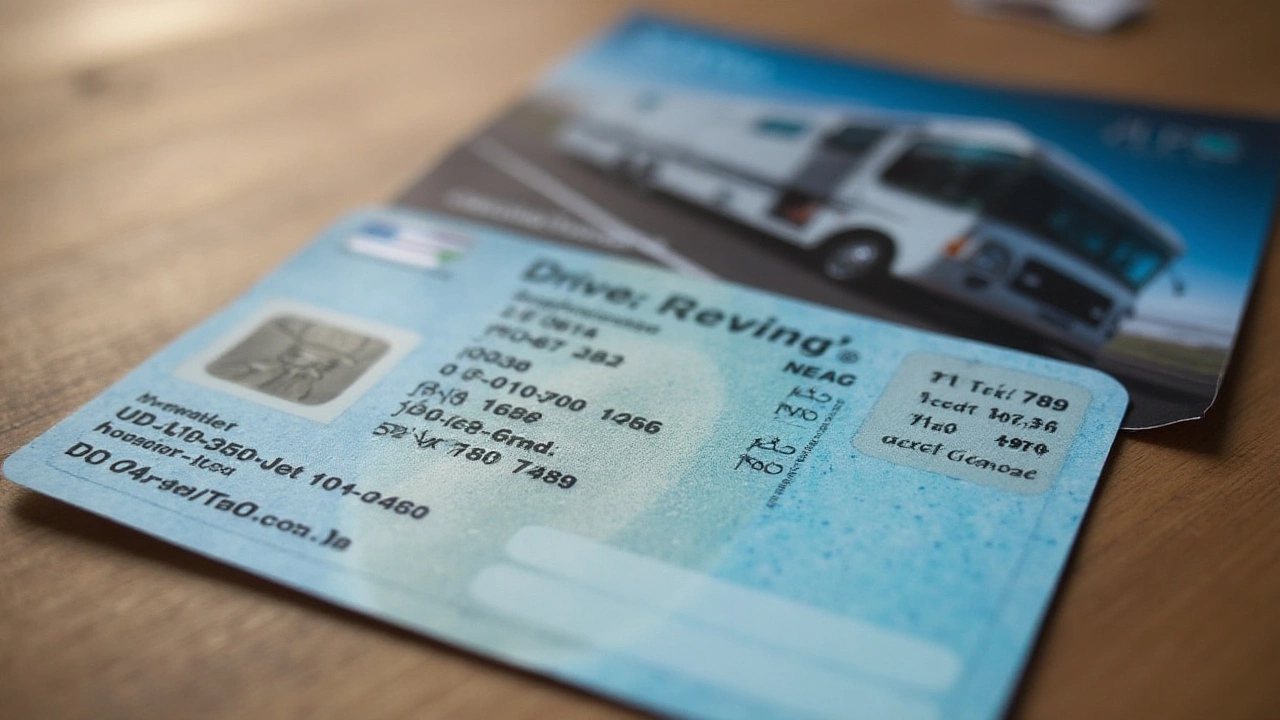Driving an RV: Do You Need a Special License?
 Dec, 31 2024
Dec, 31 2024
Driving an RV opens up a world of travel possibilities, but it also begs the question: do you need a special license to take the wheel? This curiosity often arises when potential adventurers consider the jump from conventional cars to this rolling home on wheels. The good news is, in many regions, your everyday driver's license can be just the ticket.
Determining whether a standard license is adequate boils down to the specific type of RV and where you plan to drive it. Generally, most motorhomes fall under the same regulations as typical vehicles, but some larger rigs might require an upgrade in your driving credentials.
From understanding the weight classifications of different RV types to grasping the nuances of road rules, let's take a journey into the essentials of becoming road-ready in an RV. Every aspiring wanderer should have a clear route planned out, starting with the right paperwork to hit the highways safely and legally.
- Standard Licensing Requirements
- Types of RVs and Their Classes
- Understanding Weight Limits
- Tips for First-Time RV Drivers
- Navigating Legalities and Rentals
Standard Licensing Requirements
Understanding whether you need a special license to drive an RV is essential for planning your road trips smoothly. Interestingly, in many regions, a standard driver's license is perfectly sufficient for operating certain classes of recreational vehicles. This sounds like a dream for those eager to embark on journeys without diving into additional paperwork or tests. However, the simplicity of licensing requirements largely depends on the type and size of the RV you're looking to drive.
Most RVs fall into categories based on weight and dimensions, and these categories often dictate the type of license required. In numerous places, vehicles up to 26,000 pounds, including many Class B and Class C motorhomes, typically only need a standard driver's license. For example, Susan P., an RV enthusiast from California, once shared, "I never knew my standard driver's license was enough for my Class B RV. It opened up endless traveling possibilities with zero hassle!"
But what about those larger beasts, the Class A motorhomes? These RVs can exceed the typical weight and require what's known as a commercial driver's license (CDL) or a special endorsement. This is especially true in states such as Texas and Michigan, where their sheer size demands heightened driving skills. Depending on the state, the requirement might alternate between a specific CDL Class B or a more localized classification.
For many guys planning long journeys across different states in the US, it's crucial to check specific state regulations since they can vary dramatically. For instance, what passes as okay in California might not be the same in Maryland. This discrepancy stems from the multi-jurisdictional nature of RV usage, and every traveler should do their due diligence before hitting the road.
It's not just about the weight, though. Other factors such as towing another vehicle or considering your RV's brakes can also influence the kind of license you'll need. Consulting with your local Department of Motor Vehicles is wise; they provide comprehensive insights into what's permissible under your current driver's credentials and what modifications might need enforcement.
RVs Across States
Crossing state lines adds another dimension to licensing needs, especially when rental companies keep pointing out this necessity. Many rental agencies simplify the process by ensuring the rented RV meets state laws, so those driving it feel the same security across numerous jurisdictions. Always check with your rental provider about these requirements to maintain an efficient travel experience.
"Navigating through license requirements can be daunting, but it's a part of the journey that ensures safety on the road." - The National Recreational Vehicle Dealers Association
Ultimately, the secret to enjoying a road trip lies in understanding these requirements without the added stress of potential penalties or legal issues. By getting familiar with these licensing norms and confirming them, you're already halfway to your next successful and worry-free adventure.
Types of RVs and Their Classes
When it comes to the world of recreational vehicles, or RVs, there’s a dizzying array of options tailored to different tastes, needs, and legal classes. The term 'RV' is a blanket description for motorized homes that can range from small campervans to sprawling motorhomes. For the adventurer looking to hire a motorhome for an epic road trip, understanding these distinctions is crucial, particularly when navigating which vehicles your standard license covers. Let's start with the three primary classes of RVs: Class A, Class B, and Class C, each with its own defining characteristics and typical licensing requirements.
Class A Motorhomes
These titans of the road are often what people envision when thinking about RVs. Built on a bus chassis, Class A motorhomes offer luxury and space, ideal for extended travel. They can range from 26 to 45 feet long, featuring amenities that rival those of any high-end apartment, including full kitchens, bathrooms, and even washer-dryers. However, their size means they typically weigh over 26,000 pounds, which might necessitate a special class of license depending on the region you're driving in. These magnificent machines are often akin to driving a small building, but don’t let that daunt you; with the right preparations, it's a rewarding experience.The Class B RV, often dubbed the campervan, is the smallest of the main types, built on a van chassis. These vehicles are agile, fuel-efficient, and perfectly suited for quick getaways. While they lack the expansive interiors of their Class A counterparts, their compact size translates to ease of driving and parking, often requiring nothing more than a standard driver's license. This makes them popular among those who crave adventure mixed with simplicity. Nonetheless, despite their smaller dimensions, Class B RVs can be outfitted with ingenious space-saving features that maximize every inch, embodying the old adage that good things come in small packages.
Class C Motorhomes
Now, somewhere between the sophistication of Class A and the nimble nature of Class B lies the Class C motorhome. Easily recognized by the over-cab sleeping area, these RVs are built on a truck or van cutaway chassis and offer a balance of space and maneuverability. Typically ranging from 20 to 33 feet in length, they provide a cozy option with many conveniences of Class A models but in a more manageable package. Whether navigating through bustling cities or winding country roads, Class C's versatility often makes it a favorite choice. Interestingly, these often also fall under the purview of a standard license, but as with any motorhome hire, always verify local regulations.“Understanding which class of RV suits your needs isn't just about preferences; it’s also about knowing the legal requirements and ensuring a safe journey,” advised a representative from the national RV Dealers Association, highlighting the importance of prior research before setting off on an adventure.
In conclusion, knowing the RV classes empowers you to choose your adventure wisely, aligning your travel desires with logistical realities. Whether opting for the compact convenience of a Class B, the balanced comfort of a Class C, or the luxurious space of a Class A, each has something unique to offer, waiting to transform your road trip dream into reality.

Understanding Weight Limits
When it comes to driving an RV, one of the most crucial considerations is understanding the vehicle's weight limits. This isn't just for safety; it's also about compliance with the law. Weight limits for RVs vary based on type and class, and exceeding these limits can have serious implications. The most commonly discussed weight measure is the Gross Vehicle Weight Rating (GVWR), which represents the maximum operating weight of the vehicle as specified by the manufacturer, including the RV itself, cargo, and passengers.
One of the first steps in determining if your standard license covers your RV is to check the GVWR. Most jurisdictions allow a standard driver's license if the GVWR is under 26,000 pounds. However, once this threshold is surpassed, you might need a commercial driver's license (CDL) or a specialized permit, depending on the specific state or country rules. RVs, especially larger motorhomes, can easily tip the scales if they're carrying a full tank of water, fuel, and luggage. It's also noteworthy that some roads and bridges have weight restrictions, and additional permits may be required in these situations.
Let's dive into the considerations of axle weight ratings, which often get overlooked. Every RV comes with separate ratings for front and rear axles, known as Gross Axle Weight Rating (GAWR). It's crucial to distribute your load evenly between the axles, as concentrating weight towards one can reduce handling safety and strain the vehicle's components. Many enthusiastic RV owners recommend a stop at a weigh station to verify axle weights. This proactive measure can prevent unwanted surprises and ensure compliance with regulations.
Factors Affecting Weight Limits
Several factors influence the weight limits of RVs. The type and material of the chassis, for instance, determine load-bearing capacities. Larger, luxury motorhomes, often classified under Class A, are built on heavy-duty truck chassis, allowing for higher weight capacities. However, Class B and Class C motorhomes, known for their versatility and economy, often have lower weight thresholds. Another factor is whether towing a vehicle or trailer is involved, as this adds to the gross combined weight (GCW) of your vehicle. Many eager travelers are surprised by how quickly the weight adds up when you include recreational equipment, personal gear, and other essentials carried for long trips.
"It's not only about the weight but how you pack it," states seasoned RV traveler and blogger, Mike Wendland. "Balancing loads and knowing your limits keeps the adventure safe and stress-free."
Being informed is the key to understanding and adhering to RV weight limits. For those planning long journeys, a regular check with local DMV or transport authorities for updates on regulations can be invaluable. With a bit of foresight and preparation, your adventure in the open road becomes not just exhilarating but also safe and responsible.
Tips for First-Time RV Drivers
Embarking on your first journey in an RV rental can be quite the adventure, a far cry from your typical road trip outings. The unpredictability of driving these motorized behemoths requires a certain knack along with a few practical tips that could turn potentially nerve-wracking moments into smooth sails. One of the first steps is to familiarize yourself fully with the vehicle’s layout before hitting the road. Understanding your RV’s dimensions is crucial not only for safely navigating through narrow streets but also for parking in tight spots. Many newcomers underestimate the space they occupy and can easily find themselves in awkward predicaments at fuel stations or crowded campsites. Take note of the height, width, and length of your RV and keep them in mind as you travel.
Planning your stops is another major consideration. Unlike in smaller vehicles, you can't just pull over anywhere for a break. Being strategic about rest stops and fuel intervals will save you from the hassle of U-turns and reverse maneuvers in unfriendly territories. Many seasoned RV drivers recommend plotting your route using apps that cater specifically to motorhome travelers, offering insights on RV-friendly routes, campgrounds, and rest areas. Paying attention to weather conditions is equally important; foresight regarding high winds or icy conditions could determine the viability of some destinations.
Another significant tip involves constant vigilance with fuel. While an RV driving license might not be necessary, an appreciation for fuel consumption certainly is. Motorhomes aren't known for their efficiency, so maintaining a half-tank minimum is a safe practice. Long stretches of open road mean fewer gas stations, so staying ahead of your fuel needs is key. On that note, regular maintenance checks are indispensable. Tires in particular demand attention, as poorly inflated tires can drastically affect handling and safety.
Checklists and Readiness
Before setting out, create a thorough checklist covering all equipment and amenities. Ensure you have the right gear packed, from electrical cords to kitchen essentials. RVs can often require specialized items, such as chalk for parking on uneven ground, which a first-timer might overlook. Once on the road, you'll appreciate the reassuring effect of having everything you need ready at hand. Equipping yourself with a reliable emergency kit is also advisable.
"The art of travel entails preparation and curiosity," said travel expert Rick Steves. This wisdom holds especially true for RV travel, where preparation creates the foundation for enjoyable exploration.
Finally, patience is paramount. Maneuvering an RV is different from driving a car; turning takes longer, stopping requires more distance, and the entire experience is about taking your time. Slow down and enjoy the scenery, because that's the beauty of RV travel. Each drive is as much about the journey as the destination, and those are the sort of experiences that build confidence for future trips on the open road.

Navigating Legalities and Rentals
Embarking on the journey of renting an RV can feel like navigating a maze of legal terms and requirements, but fear not! Let's break it down with ease. The primary thing to understand is that the rules governing RV rentals often vary by region, meaning that what's legal in one state or country might be different in another. For instance, while a standard driver's license suffices for many RV rental situations, others might require endorsements for larger vehicles. The boundaries of these laws are determined by factors like vehicle weight and class, which can vary considerably.
Before diving into the world of motorhome hire, it’s crucial to acquaint yourself with the specifics of insurance coverage and liability. Most rental companies offer insurance, but the coverage might not be as comprehensive as you'd like. Knowing what exactly you're insured for can save you headaches down the road. Additionally, certain rentals require you to hold a valid credit card, not just for payment but for a deposit meant to cover potential damages. This is standard practice, but definitely something to keep in mind when planning your rental strategy.
In many instances, the age of the renter plays a critical role. Some companies enforce minimum age requirements, typically around 25 years, due to insurance policies. Interestingly, younger drivers might face higher insurance fees, which is something often overlooked in the excitement of planning a trip. A great tip here is to always ask about any potential hidden fees or costs that might be buried in the fine print.
"Understanding the regulations and requirements before you drive off the lot can keep your trip running smoothly, without any unexpected bumps along the way." - Camping World
When choosing an RV rental company, a little research can go a long way. Apart from comparing prices, which is naturally a prerogative, look into customer reviews and past experiences. Many websites now provide platforms for genuine customer feedback, which can give you insights into the reliability and service quality of a company. Additionally, it helps to confirm the availability of roadside assistance and technical support, especially for longer trips where mechanical woes could potentially disrupt your holiday plans.
To make the process even smoother, keep an eye on any special deals or discounts offered by rental companies. Often, these promotions cater to off-season rentals or extended rental periods. If you plan your trip well in advance, it might lead to significant savings, which is always a welcome relief when budgeting a long road adventure. A little advance planning in this vibrant sphere of RV rental can open up a world of possibilities, ensuring you're legally ready and prepared for the journey of a lifetime.